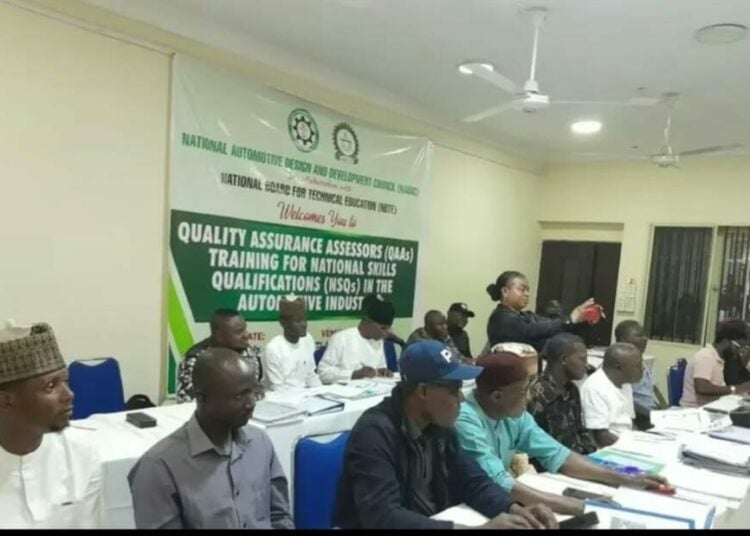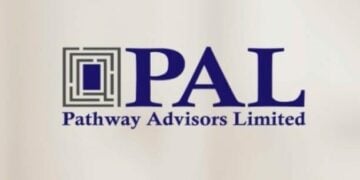The federal government is stepping up efforts to close Nigeria’s automotive skills gap by training 30 new Quality Assurance Assessors under the National Skills Qualification Framework (NSQF), a structured, competency-based system for enforcing national and international technical standards.
The director-general of the National Automotive Design and Development Council (NADDC), Joseph Osanipin, represented by the director of industrial infrastructure, Dr. Nua Omisanya, said this in Abuja at the official closing of a two-week Quality Assurance Assessors Training for National Skills Qualifications (NSQs) in the automotive industry. The training, organised by the NADDC in collaboration with the National Board for Technical Education (NBTE), had 30 participants drawn from the six geopolitical zones of the country.
Osanipin said the initiative is designed to equip trainers who will, in turn, ensure that automotive technicians nationwide meet nationally approved skill standards.
Osanipin also pointed to the rising demand for skilled assessors due to technological innovations like electric vehicles and CNG, stressing that quality assessors are vital for ensuring mechanics follow standardised procedures for better job performance.
“These are the new innovations in Nigeria’s automotive industry, and we need more learners trained so that vehicles on our roads will be well-managed and well-maintained,” he said.
He highlighted key focus areas including Compressed Natural Gas (CNG) conversion, Electric Vehicle (EV) maintenance, and modern diagnostic techniques.
Before this initiative, the industry had only 15 assessors, but the current training doubles that figure to 45. “This will help us meet the skills gap in the auto industry,” Osanipin said.
According to him, assessors will train and evaluate learners on quality assurance and competency, ensuring standardised practices replace the trial-and-error methods previously common in vehicle maintenance. “With this system, maintenance of emerging technologies like CNG and electric vehicles will follow standard procedures,” he said.
Osanipin speaking further, urged the trainees to take the programme seriously, noting it was fully funded and carried significant value for both the industry and the country. “Teamwork is essential in sustaining the tempo in learning to ensure success in the final assessment week,” he said.
He explained that under the NSQF system, assessors serve as gatekeepers of quality, evaluating technicians against strict standards to ensure vehicles are serviced correctly and safely. Without enough of them, training becomes inconsistent, leaving dangerous gaps in safety, performance, and customer confidence.
He disclosed that the next phase of the programme would involve fieldwork, where trainees will interact with learners and industry professionals to gather feedback. This, he said, would help assess the inputs and outcomes of the training programme and guide future improvements.
Lead facilitator of the programme, Olubode Majiyagbe, said the NSQF would introduce both national and internationally recognised standards to the automotive industry, addressing a long-standing lack of uniformity in training. “The first phase, a two-week in-class activity, is being concluded, after which participants will proceed to fieldwork for eight to twelve weeks before returning to complete the programme. Successful participants will be awarded the Quality Assurance Assessor qualification,” he said.
Majiyagbe commended the NADDC leadership for introducing the framework to the sector and urged participants to become advocates for its adoption nationwide.
Governor for the 2025 Class, Joke Onireti, emphasised that the training would eliminate “trial and error” practices by encouraging mechanics to specialise. “You either know your job or you do not. If you are trained in periodic maintenance, you should specialise and excel in it, rather than being a jack of all trades,” she said.
Onireti explained that assessors would evaluate mechanics’ skills in their chosen areas, identify strengths, and recommend further training where needed. “This will ensure that when you take your car for repairs, you get value for your money without further damage being done,” she said.
She also noted that the certification would be tiered from entry-level trainees (Level 1) to advanced practitioners (Level 3), reflecting their ability to work independently and meet industry standards.
One of the participants, Mrs. Divine Isi of Floritech Motors, Warri, Delta State, described the training as “impactful,” saying it expanded her knowledge despite nearly two decades in the automotive industry. She expressed gratitude to NADDC for the opportunity.
Another participant, Tunde Onakoya of Auto-clinic Academy, Ibadan, praised the NADDC and NBTE for the initiative. “This programme will raise the capacity and skills of workers in the automotive industry, enabling them to compete globally,” he said.
Onakoya added that delivering and assessing training under the NSQF would foster industrial growth and ensure Nigerian automotive professionals meet international benchmarks.
The participants collectively commended the facilitators for their expertise and pledged to promote the framework nationwide. They expressed optimism that the initiative would drive job creation, improve service quality, and position Nigeria as a competitive force in Africa’s automotive sector.





